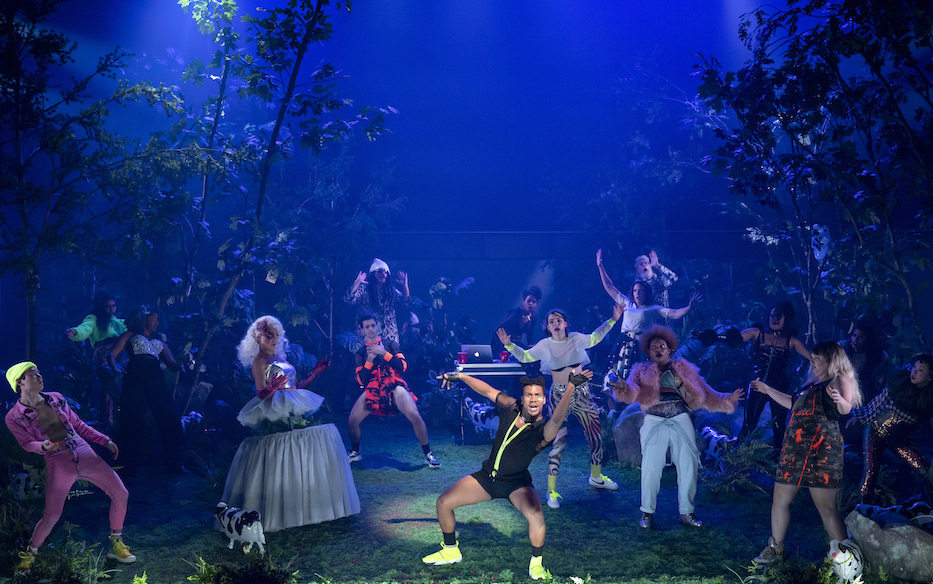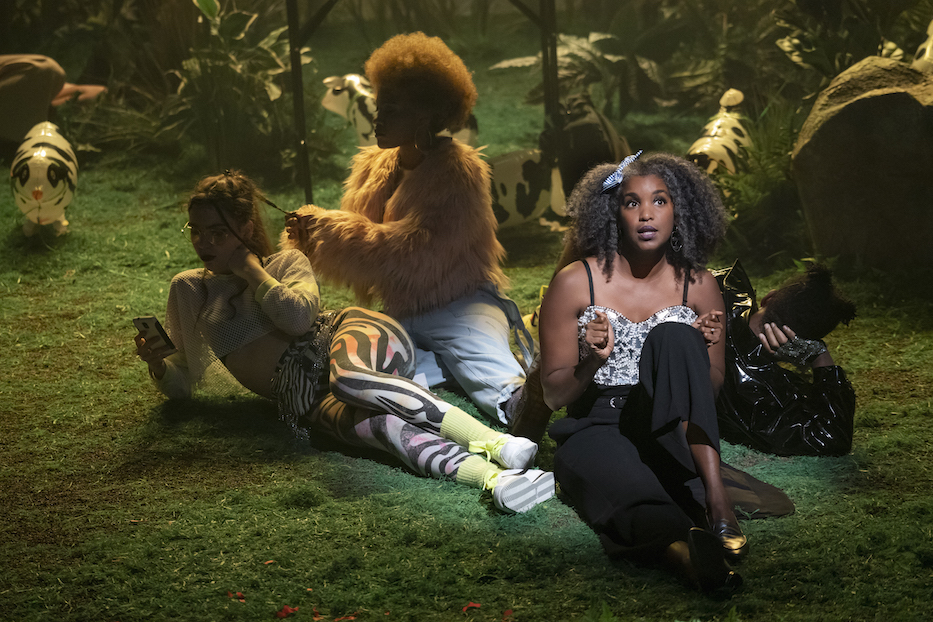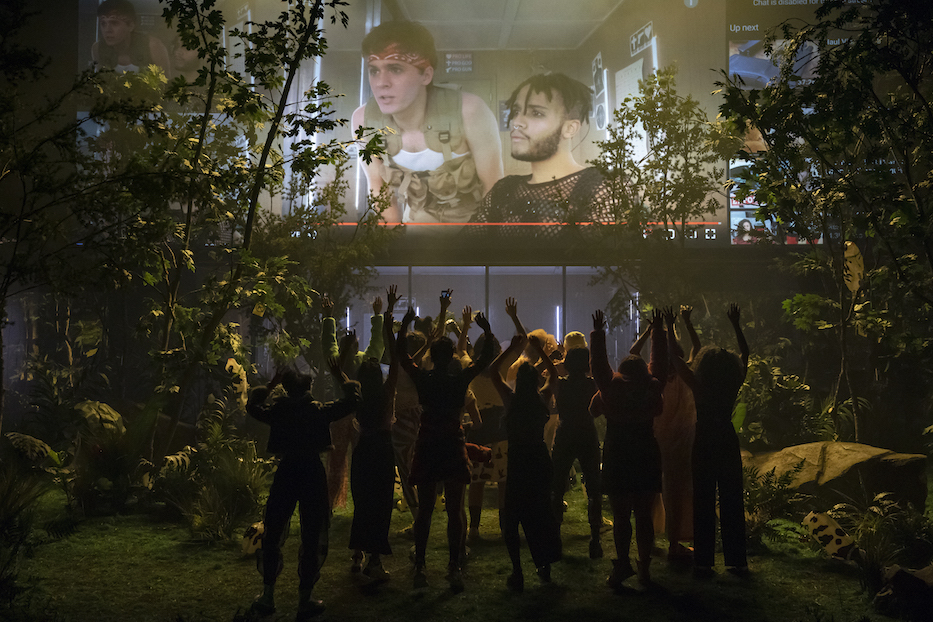
Downtown | Arts & Culture | Theater | Yale Rep Theatre

| Nicholas L. Ashe in Girls by Branden Jacobs-Jenkins, choreography by Raja Feather Kelly, directed by Lileana Blain-Cruz, Yale Repertory Theatre, 2019. Photo by Joan Marcus. |
At first, Deon is just a boy in the woods. Pants hang on his hips just so, one button undone beneath a half-moon of black mesh and brown skin. A folding table sits snugly under his arm. He looks around. There’s magic afoot here: everything is overgrown and tangled, with trees the color of emerald and rhyolite. The sky belches big, beautiful white clouds of ash. It looks like he might stay a while, and maybe we should too.
This world—which is not our world, and not not our world either—builds the fantastical, lush, and chilling backdrop to the world premiere of Branden Jacobs-Jenkins’ Girls, running at the Yale Repertory Theatre through Oct. 26. Directed by Lileana Blain-Cruz with propulsive choreography from Raja Feather-Kelly, the work is a contemporary retelling of Euripides’ Bacchae, with resonances meant to shock the audience into being. And it works, sometimes.
In some ways, the Bacchae is the perfect play for Jacobs-Jenkins, who is no stranger to wildly inventive, trenchant dramatic adaptations. In the original text, Dionysus returns to Thebes with a bone to pick with the gods, who have refused to accept him into their ranks. He’s young and angry, because his father (who happens to be Zeus) didn’t want anything to do with him and neither does his maternal grandfather, Cadmus. Neither does the rising ruler Pentheus, who forbids Dionysian worship because he’s a big ol’ square and also happens to be his cousin because of course he is.
When Dionysus sees just how unwelcome he is—even as a stranger—his response is to throw a party and grow his cult of female worshippers, get his cousin to come in drag and orchestrate his murder in a particularly incestuous and grisly way. It gives Jacobs-Jenkins an opening: tear the dusty capital T from tragedy and seize on the violence inherent in patriarchy and normative masculinity, and the way it’s killing both men and women.
In Girls, the audience meets not Dionysus but Deon (Nicholas L. Ashe) in the club/clurb, “a dense thicket of woods in a public park outside a town just like this.” From the moment Deon wanders in, Jacobs-Jenkins dips his hands into the story and starts pulling out gold and strobe lights and a seething beat.

| A scene from Girls by Branden Jacobs-Jenkins, choreography by Raja Feather Kelly, directed by Lileana Blain-Cruz, Yale Repertory Theatre, 2019. Photo by Joan Marcus. |
It’s refreshing and a little jarring too: a setting in close-by, nowheresville America means that this party could be unfolding in Sleeping Giant or the fresh, verdant hell of Litchfield County or somewhere on the Appalachian Trail. Either way, the audience is just one club-worthy beat away from joining in. And they do—characters speak almost entirely to the audience instead of to each other, implicating the viewer in the action that unfolds.
Just as in the Bacchae, this modern-day-Dionysus has an ax to grind: he is the illegitimate son of the town’s silk-throated meteorologist—so, basically Zeus—whose ex-wife shot his mother to death days before she was due to give birth. After he was lifted out of her dead body, he was hidden away, then sent to boarding school. Meanwhile, his cousin Theo (Will Seefried) has turned into a gun-obsessed incel and professional white baby man, determined to become a sheriff who can keep things in order.
Ashe lays the exposition on thick (“you’re early!” he announces as a sort of icebreaker that doesn’t entirely work), but he’s sweet and conversational, and it goes down easy enough. As he sets up a table of DJ equipment—”just don’t call me an influencer,” he instructs—women of the town trickle in half-dazed and already dancing, slipping each other booze and MDMA. As they drop and gyrate, the lighting turns them into other-worldly creatures (credit to Yi Zhao, whose design becomes a kind of spirit loosed from the trees), then snaps back to reality again.
A propulsive sound design from Palmer Hefferan soaks the stage and the theater, recognizable beats fading in and out. Sections of the play absolutely pulse, as if the audience has done one big acid drop and it’s kicking in all at once.
Each character—each girl, many of whom blur gender lines—has a story of how they got there, addressing an imaginary interviewer. There are women who no longer want to be lonely, women who want to dance their babies right out (“I will not have a Gemini baby”), women who don’t want to be thought of as sexual objects but can hump the stage like nobody’s business. There’s Deon’s aunt Gaga (a progressively crazed Jeanine Serralles), whose drug-fueled madness goes from funny to decidedly not as she chronicles the men who have held her back.
All of them, it seems, are there to forget and remember themselves, without the slut shaming of the town below. Costume designer Montana Levy Blanco hits a stride here: he teeters on the edge of club-chic, then jumps off the deep end into a place where leopard-print jumpsuits and 80s-style hot pants can appear together.

| Maia Mihanovich, Gabby Beans, and Ayesha Jordan in Girls by Branden Jacobs-Jenkins, choreography by Raja Feather Kelly, directed by Lileana Blain-Cruz, Yale Repertory Theatre, 2019. Photo by Joan Marcus. |
It’s a sensibility that marries a classical Greek chorus with something out of Gosford Park and the early days of MTV: confessional, confounding, fantastical but not specifically fantastic. It gives both playwright and crew a chance to showcase their grip on the tenuous divide between real and not real: when Deon’s mother enters to the echoing notes of Adele’s “Hello,” a slip of a thing with her face blown clear off, it's absurd and fits perfectly.
As he straddles worlds—there’s a lot of nonbinary goodness here, or at least that's what it's going for—Jacobs-Jenkins raises questions that seem reserved not for Greek tragedy but for the world of monster drag and the longtime queering of witchcraft and of bodies that are not white and not normative. By the time one of the eponymous girls (Ayesha Jordan) launches into a long rant about her desk chair, it’s not about the chair at all, but the need to not have one more thing creating discomfort in a life where to be a woman (and in this case, a woman of color) is to be in pain already.
It sets the audience up to see two worlds: the party, where Deon wanders off and the music keeps going and no one wants the night to end because they are free, and the small-minded town below, where Deon’s hapless grandfather Dada (Tom Nelis) and uncle (Haynes Thigpen) are afraid of losing their power but genial in their patriarchy, as if that makes up for it. It’s familiar, like the choreographed beats oozing over the audience that one still can’t quite place.
The high stakes of this tragedy and tension don’t always work. Instead of Theban folkways, Jacobs-Jenkins has tried to navigate toxic masculinity, gun culture, oversaturation of media and an overreliance on technology, and sometimes it feels like a lot to take in. Seefried is sometimes so reliant on gun-toting, 4chan-loving stereotypes that he’s hard to watch, moving past dark comedy into a sort of no-man’s land. When he shows off his plan to weaponize violence, it’s immediate and visceral—but does it also push the audience too far? Is is supposed to?
Thigpen, too, doesn’t quite hit the mark, and ultimately feels like a vestige of the old play that wasn't necessary in the new one. As various characters , he starts with a rhythm that’s quite funny, but ultimately loses it to hysteria that feels heavy-handed and overblown. No matter: when he doesn’t quite nail it as a Cowherd (or is that coward?) his inflatable balloon cows do a surprisingly good job of getting a message across.
The flipside is that when they do work, they really do. In a smart but gut-churning move, the crew uses a mix of live-acted YouTube and Facebook projections from projection designer David Bengali to bridge the club/clurb and town, layering the worlds perilously on top of each other. It gives the team opportunities to experiment with wordplay, tech equipment glitching as characters mishear “cowherd” for “coward,” “loner” for “loser." Theo moves in and out of the frame and exposes multiple realities, as if he’s pulling back the curtain on both the play and on himself.

| Will Seefried and Nicholas L. Ashe and the company of Girls by Branden Jacobs-Jenkins, choreography by Raja Feather Kelly, directed by Lileana Blain-Cruz, Yale Repertory Theatre, 2019. Photo by Joan Marcus. |
As the screens wink on and off and on again, Rigg’s set keeps shifting, the audience watching as mirrored walls give way to a taxidermied elk head and squat, dimly lit house in which Deon reasons with Theo, exacting his revenge. The placement of the screen works, hanging over a knot of dancing bodies like a god over a mountain below.
And yet, it’s the girls at the core of Girls who make the show. These club rats sway, lock and unlock their hips, lose items of clothing to the music, hump the ground and each other. In a testament to Kelly’s choreography, they are rarely still, which makes their stillness and slow, molasses-like movement more remarkable when it happens. Just as it seems they are best left scattered, they turn themselves into a locomotive, literally supporting one another as a ghost rises from the woods and tells her story. Their bodies alone are proof that one cannot, as Theo suggests, “regulate” another human without cataclysmic consequences.
In that way, this isn’t a play about Deon avenging his mother, so much as a play about the inevitability and inelegance of female rage and the place it lives within all of us. Among his possessed girls, Ashe delights in his wickedness. He lives in the in-between, the lilt and lift of his voice so very different from the men he might in another world call family. He dances it out, and calls on his followers to do the same.
It ends with not one bang, but many. It's hard to watch. And in the silence that settles afterwards, it feels like it couldn’t have been any other way.
Branden Jacobs-Jenkins’ Girls runs at the Yale Repertory Theatre through Oct. 26. Tickets and more information are available here.

